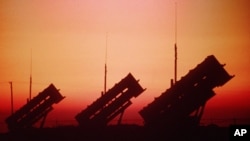The question of missile defense is not addressed in the New Strategic Arms Reduction Treaty (START), recently signed by the United States and Russia. But the issue remains contentious between Washington and Moscow.
The New START treaty deals essentially with limiting offensive nuclear forces.
Under the terms of the pact, each country will have no more than 1,550 deployed strategic, or long-range, nuclear warheads. It also sets a limit of 700 operationally deployed strategic nuclear delivery systems such as intercontinental ballistic missiles (ICBMs) and heavy bombers. To ensure that neither side violates its treaty obligations, the New START accord has what U.S. officials call strong verification provisions.
What the treaty does not address directly is the issue of missile defense. But Daryl Kimball, Executive Director of the Arms Control Association, a private research firm, says the accord mentions the relationship between offensive and defensive weapons.
"The United States and Russia have for decades understood that there is a relationship between the number of strategic interceptors you have and the number of strategic offensive missiles each side has," said Kimball. "That has been written into the preamble of previous arms control agreements, including START I of 1991. This treaty is no different. In the preamble, the non-binding preamble, it says that there is an interrelationship between the two. However, the legal limits of the treaty only affect offensive systems."
For years, Moscow has argued that the proposed U.S. missile defense system is aimed at Russia, a view rejected by American officials.
John Bolton is a former U.S. Ambassador to the United Nations and an arms control expert:
"We have explained to them ever since 2001, when the [George W.] Bush administration withdrew from the 1972 Anti-Ballistic Missile Treaty, that the only plans the United States had were to have a national missile defense capability against limited nuclear strikes, against the strikes that rogue states like North Korea or Iran or back then Iraq, might have been capable of," said Bolton.
But Moscow continues to be concerned about future U.S. missile defense plans to such an extent that Russian officials issued a unilateral statement saying they reserve the right to withdraw from the New START treaty, if Washington's missile defense plans pose what they consider to be a threat to Russia's strategic nuclear deterrent force.
During testimony before the U.S. Senate Foreign Relations Committee in May, Secretary of Defense Robert Gates said such unilateral statements are not new.
"We have made these unilateral statements on other issues relating to virtually every other strategic arms agreement we've had with the Russians on one subject or another, neither has ever considered them binding," said Secretary Gates
Gates went on to say that the United States will forge ahead with its missile defense plans.
"We are going forward with a second missile defense field at Fort Greeley [Alaska]," added Gates. "We're putting more than a billion dollars into the two- and three-staged ground-based interceptor programs. We're buying Thads [air defense missiles]. We're buying Patriot 3s [missile interceptors]. We're buying SM 3s [ballistic missile defense]. We're buying x-band radars [a type of sea-based radar]. We have a comprehensive missile defense program and we are going forward with all of it. The Russians can say what they want. These unilateral statements are totally outside the treaty. They have no standing; they are not binding, never have been."
Critics of the New START Treaty, such as Ambassador Bolton, say Moscow's unilateral statement hinders U.S. missile defense plans.
"It is very important given that they have said that if they saw the United States developing a national missile defense capability that troubled them, that would be a right to withdraw from the treaty. That's a very significant limitation, I think, on U.S. ability to go forward," noted Bolton.
But most experts say the New START treaty does not hamper U.S. missile defense plans.
Joseph Cirincione is President of the Ploughshares Fund, a foundation focusing on nuclear weapons policy.
"The treaty in no way limits U.S. plans for its missile defense, production plans, deployment plans - nothing like that. And the military commanders in the United States have testified to that," explained Cirincione. "The Chairman of the Joint Chiefs has said it does not limit our U.S. missile defense plans. The head of the Missile Defense Agency, [Army Lieutenant] General [Patrick] O'Reilly has said that this in no way limits U.S. missile defense plans. And in fact, we're better off with the treaty than without it."
To come into effect, the New START treaty must be ratified by the Russian parliament (Duma) and the U.S. Senate. A total of 67 out of 100 Senators must vote in favor of the pact. Experts expect the New START treaty to be ratified, but they do not know when the Senate will vote on the accord.




